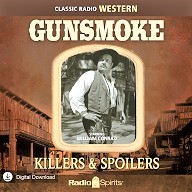
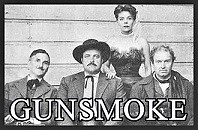 Gunsmoke (April 26, 1952-June 18, 1961) aired “Trojan War” on February 28, 1953 as the 45th of its 480 original episodes. This is the third episode of Gunsmoke we’ve presented here, the first coming in early January of 2020 and the second from June of 2020. Thus, a reprise from that initial offering of some of the history and background of this excellent radio program is in order for newcomers.
Gunsmoke (April 26, 1952-June 18, 1961) aired “Trojan War” on February 28, 1953 as the 45th of its 480 original episodes. This is the third episode of Gunsmoke we’ve presented here, the first coming in early January of 2020 and the second from June of 2020. Thus, a reprise from that initial offering of some of the history and background of this excellent radio program is in order for newcomers.
The show took place during the post-Civil War era (circa 1870) in Dodge City, Kansas during the expansion and settling of the Old West. On radio William Conrad (1920-1994, photo lower left) played Marshal Matt Dillon. On television Marshal Dillon was played by James Arness. On radio Parley Baer (1914-2002) played Dillon’s “assistant” Chester Wesley Proudfoot. On television Chester was played for the first couple of years by Dennis Weaver. On television, Chester’s last name was changed from Proudfoot to Goode. On radio Howard McNear (1905-1969) played Dr. Charles Adams. On television Doc was played by Milburn Stone. On radio Miss Kitty was played by Georgia Ellis (1917-1988, photo lower right). On television Miss Kitty was played by Amanda Blake. While the radio program ran for a solid 10 years (1952-61), the television program ran for 20 years (1955-75) and overlapped with its still airing counterpart on radio, and until programs airing after the television show’s demise, television’s Gunsmoke ranked as the longest running original live action (as opposed to animated) show of all time.
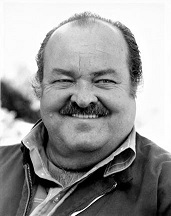
 As to the origin of Gunsmoke on radio, the story goes that in the late 1940s legendary CBS chairman William S. Paley, who was a fan of the Philip Marlowe detective series on radio, asked the head of programming to develop “a hardboiled Western” about a Marlowe of the Old West. Though an attempt was made, complications arose and the project was shelved. Enter producer Norman MacDonnell and writer John Meston a few years later, who discovered the shelved project while in the process of creating an adult Western of their own for radio (in contrast to radio westerns such as The Lone Ranger or The Cisco Kid, who were aimed primarily at a younger audience).
As to the origin of Gunsmoke on radio, the story goes that in the late 1940s legendary CBS chairman William S. Paley, who was a fan of the Philip Marlowe detective series on radio, asked the head of programming to develop “a hardboiled Western” about a Marlowe of the Old West. Though an attempt was made, complications arose and the project was shelved. Enter producer Norman MacDonnell and writer John Meston a few years later, who discovered the shelved project while in the process of creating an adult Western of their own for radio (in contrast to radio westerns such as The Lone Ranger or The Cisco Kid, who were aimed primarily at a younger audience).
Gunsmoke on radio was a critical and popular success, noted for its realism and willingness to tackle adult and/or explicit subject matter such as opium addiction, scalpings, and massacres among other adult situations and themes (Marshal Dillon, having saved a prostitute from rapists in one episode, was yet unable to dissuade her from her chosen profession). The show was not all dark and somber, however, and evolved over time into a genuinely warm and sometimes humorous “celebration of human nature.” To reinforce the realism of the excellent scripts and often times gritty subject matter, the show also rose above others due to its special effects, which brought the listener even deeper into a dusty, crowded, Dodge City, where children could be heard playing a block away, or a dog barking nearby. It was a total immersive experience for radio, and solidified the claim of the program as the first truly adult Western series on radio.
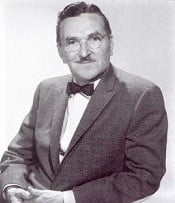
 Those familiar with the original The Andy Griffith Show (1960-68) on television will recognize the names of Parley Baer (photo at left) and Howard McNear (photo at right). They would find themselves teamed up again as they were on radio’s Gunsmoke, with Baer playing the character of Mayberry Mayor Roy Stoner, and with McNear playing Floyd the Barber. Sometime shortly after he was cast as this recurring character McNear had a stroke, almost completely paralyzing the left side of his body. He took more than a year off, but when asked by Andy Griffith to return he rejoned the cast in 1964, though camera angles and his poses had to be adjusted for. His condition deteriorated so much that after time he could no longer remember his lines. Frustrated, McNear left the show in 1967. He passed away from complications of pneumonia following another stroke on January 3, 1969. Parley Baer, his longtime friend from both Gunsmoke on radio and The Andy Griffith Show on television, read his eulogy.
Those familiar with the original The Andy Griffith Show (1960-68) on television will recognize the names of Parley Baer (photo at left) and Howard McNear (photo at right). They would find themselves teamed up again as they were on radio’s Gunsmoke, with Baer playing the character of Mayberry Mayor Roy Stoner, and with McNear playing Floyd the Barber. Sometime shortly after he was cast as this recurring character McNear had a stroke, almost completely paralyzing the left side of his body. He took more than a year off, but when asked by Andy Griffith to return he rejoned the cast in 1964, though camera angles and his poses had to be adjusted for. His condition deteriorated so much that after time he could no longer remember his lines. Frustrated, McNear left the show in 1967. He passed away from complications of pneumonia following another stroke on January 3, 1969. Parley Baer, his longtime friend from both Gunsmoke on radio and The Andy Griffith Show on television, read his eulogy.
The “Trojan War” finds Matt out looking for the stage, curiously late on its regular run to Dodge—its lateness even more troubling after he first confronts a murderous gang from his past who has made an untimely appearance in Dodge. What Matt discovers reveals once again stark evidence of the harsh realities of violence and sadness endemic to the still untamed Old West for those who brave this often lawless and unforgiving land to make a new life for themselves. And where slowly but surely a measure of justice can be found, often accompanied by the smell of…gunsmoke.
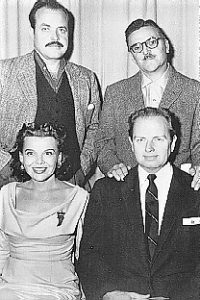
Play Time: 29:39
{Though there were previous western radio shows before Gunsmoke‘s debut, there was something about it that set it apart from its predecessors. After listening to this early episode of Gunsmoke in the winter of 1953 and having some snow shoveling money left over after buying their usual science fiction magazines, the neighborhood gang found themselves at the local newsstand looking for further adventures set in the Old West. New Western Magazine (1934-54) appeared to be a reliable choice and one of the relatively few western genre magazines (as are the other two examples below) to have survived the genre’s heyday of the 1930s. It was a bi-monthly in 1953. 10 Story Western Magazine (1936-54) held to an unbroken monthly schedule until 1951 when it transitioned to a bi-monthly until the end of its impressive run. Western Story (1919-54) was perhaps the longest continuously published western genre magazine of all time. It published two issues a month until 1945 before its pressure cooker bi-weekly schedule ended and it became a monthly until mid-1949, at which time it went on hiatus.. Returning in October of 1952, its final 9 issues were bi-monthlies, the last issue hitting newsstands with a February 1954 cover date.}
[Left: New Western, Jan. 1953 – Center: 10 Story Western, Feb. 1953 – Right: Western Story. Feb. 1953]
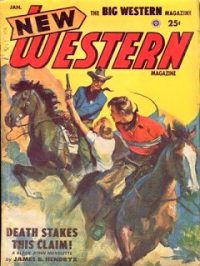
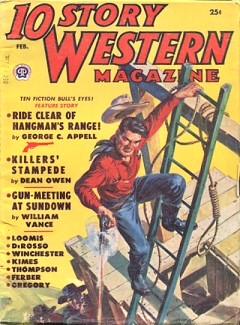
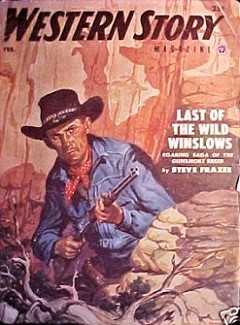
To view the entire list of weekly Old Time Radio episodes at Tangent Online, click here.